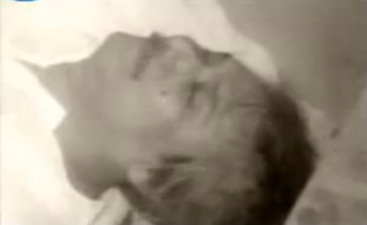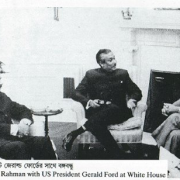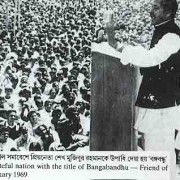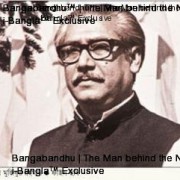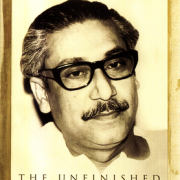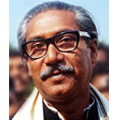The day they killed Bangabandhu
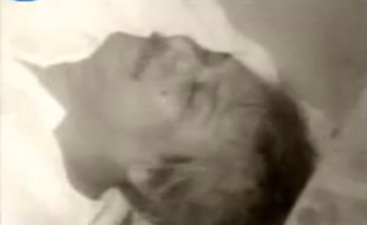 IT was Friday, August 15, 1975. It was one of the most tragic days of our history. It reminded us of the dark night of March 25, 1971. The Father of the Nation, loved and respected in Bangladesh and the world over as a great hero, lay dead on the stairs of his famous residence at Road Number 32, Dhanmandi Residential Area. He was only fifty-five. We were twenty-year-old sophomores of Dhaka University.
IT was Friday, August 15, 1975. It was one of the most tragic days of our history. It reminded us of the dark night of March 25, 1971. The Father of the Nation, loved and respected in Bangladesh and the world over as a great hero, lay dead on the stairs of his famous residence at Road Number 32, Dhanmandi Residential Area. He was only fifty-five. We were twenty-year-old sophomores of Dhaka University.
Who killed Bangabandhu? His people, whom he loved to a fault? No! They were unhappy with a few activities of his government but they never even dreamt of killing him. They who control the world like people who obey them. They don’t like nationalist leaders and great patriots like Bangabandhu or Allende. Thus, Allende dies but General Pinochet lives on and makes life miserable for his countrymen.
There are many such instances in the Third World. If you want to kill a great leader, make him unpopular through planted journalists, corrupt and disgruntled bureaucrats and dismissed soldiers. Use some of them during his killing. Then get obedient people to rule the country and serve your purpose. No wonder our High Court has ruled that governments, which succeeded Bangabandhu and his cabinet were not legal. They had captured power by sheer force.
At dawn on August 15, I got up to hear from my parents that Bangabandhu had been killed along with his family. Even ten-year-old Sheikh Russell was not spared. My initial reaction was of great shock. I was dumbfounded with sorrow. Bangabandhu didn’t deserve a death like this! He was our greatest politician. His love for his country and his people was beyond question.
Who could kill our greatest patriot? The radio and TV were announcing his death at regular intervals. A certain Major Dalim was claiming credit for his death! Who was he? We had never heard of him before!
There was fear, there was confusion. There was silent sorrow among his followers and people who admired him. There was celebrations too — we later heard. There were a few people chanting ‘Pakistan Zindabad’ somewhere in old Dhaka. There were a few Biharis, celebrating his death in Mohammadpur. But the patriotic Bangalee was silently shedding a tear or two for him. How could a Nelson Mandela or a Yassir Arafat get killed by his own people? They wondered.
Well, they killed Abraham Lincoln and Mahatma Gandhi too, didn’t they? Some argued with themselves. Years later, I learned that the first procession to protest the death of Bangabandhu was organised by the boys and girls of Chhatra Union in nowhere else but my own district Kishoreganj. They warned the real killers that the death of this great patriot would turn Bengal into a Vietnam. Student leader, Kazi Abdul Bari led the procession. He had to suffer inhuman torture in jails for his noble protest against injustice. I feel honoured today to get a chance to salute this brave student leader. May Bangladesh be blessed with more Baris and not with Mushtaques and Dalims.
What were the Chhatra League leaders and workers doing? They went into hiding because they were the most wanted people for the Mushtaque government. Many faced arrest and torture later on.
I myself saw Abdur Razzak escaping through Dhanmandi Road Number 15 and Rayer Bazar. He was a big and healthy person then with no diabetes. We wanted him to escape, live and then protest. I saw him when curfew was withdrawn for an hour and a half for Jumaa prayers.
We were not political activists but we were young and patriotic and not exactly cowards. A few of us got together and walked up to Bangabandhu’s residence, which was less than a mile from our area. There was army patrol on the roads and police guard in front of Bangabandhu’s residence. We heard that tanks were guarding Khandker Mushtaque in the Bangabhaban. We were not allowed inside Bangabandhu’s residence but nobody disturbed us when we sadly stood in front of House No. 32 and quietly saluted the greatest son of Mother Bengal.
The killing of the full family was too great a shock for us. We spotted bullet marks on the walls. An uncle of mine worked for BTV as a news journalist. He had a chance to see Bangabandhu’s dead body the next day as a member of the BTV news team. We had listened to him in rapt attention when he told us what he saw inside.
Before the curfew was clamped again on August 15, we also managed to see Sheikh Moni’s residence. There were big signs of machine gun firing on the walls. Women and children were not spared in this house too. Why this mindless killing? To spread fear? To terrorise the people and keep them quiet?
There was no Awami League worker to be seen. There was not even a Bengali nationalist to protest his death. These two types were shedding silent tears. Dhaka had suddenly gone back to the Pakistani days, it appeared. It was a heart-rending experience for us.
Thirty lakh people had embraced martyrdom for nothing? There were rumours galore. Bangabandhu was alive and not dead? Sheikh Kamal had escaped too? India could attack us any time. O God, keep Bangabandhu alive! This man doesn’t deserve such a death. We silently prayed for him.
Khandker Mushtaque claimed himself President since the morning but took the oath in the evening. The Acting Chief Justice of the Supreme Court, Justice Syed A.B. Mahmud, administered the oath to him. The Vice President, ten Ministers and six State Ministers also took oath. There were a few respected names in the cabinet.
Were they forced to join Mushtaque? The three services chiefs were present. Members of Parliament charged with corruption by Bangabandhu were also present. Mushtaque, it appeared, wanted to tell the world that only Bangabandhu was corrupt and his ministers had no fault.
The silence of the Rakkhi Bahini surprised many. A formal reaction of the Indian and the Russian governments was not coming. Ambassador Samar Sen was in Delhi. The Pakistan government was quite happy. Bhutto’s reaction said it all. We recollected that both Bhutto and Kissinger had visited Dhaka a year or so back.
Bangladesh Betar had instantly become Radio Bangladesh. What was wrong with the Bangla name? The curfew helped Mushtaque to take control in less than fifteen hours. People talked about his cunning. A few secretly called him the new Mir Jafar. He spoke to the nation in the evening. His nice words couldn’t remove our fear and anxiety.
We were happy to note that the stalwarts of the Mujibnagar government didn’t join Mushtaque. Syed Nazrul Islam, Tajuddin Ahmed, Captain Mansur Ali and A.H.M. Kamruzzaman didn’t betray their leader. Abdus Samad Azad, Zillur Rahman, Abdur Razzak and Tofayel Ahmed didn’t join Mushtaque either.
We went to sleep with heavy hearts. We loved and respected the martyred Bangabandhu even more. He had his tragic flaws but he was our greatest hero, wasn’t he? He was our greatest hero of the past, the present and the future. My twenty-year-old heart profusely bled for him. I was a budding writer. How could a writer not weep over the death of his land’s greatest patriot?
Author : Junaidul Haque writes fiction, essays and reviews books.

